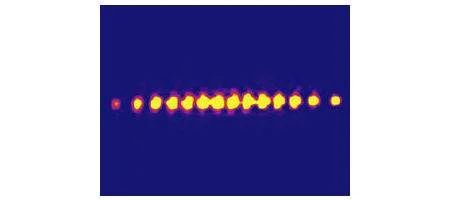Innsbruck physicists have set a world record, achieving controlled entanglement of 14 quantum bits (qubits) and thus creating the largest quantum register ever.

The team led by Rainer Blatt at the University of Innsbruck already held the record for the number of entangled quantum bits realized experimentally, managing eight back in 2005.
Now the Innsbruck scientists have almost doubled this record, confining 14 calcium atoms in an ion trap, which, similar to a quantum computer, they then manipulated with laser light. The internal states of each atom formed single qubits and a quantum register of 14 qubits was produced.
This register, says the team, represents the core of a future quantum computer. The physicists also found that the decay rate of the atoms is not linear, as expected, but is proportional to the square of the number of the qubits. When several particles are entangled, the sensitivity of the system increases significantly.
“This process is known as superdecoherence and has rarely been observed in quantum processing,” says junior scientist Thomas Monz.
In addition, the Innsbruck physicists have succeeded in confining up to 64 particles in an ion trap. “We are not able to entangle this high number of ions yet,” says Monz. “However, our current findings provide us with a better understanding about the behavior of many entangled particles.”
The term entanglement was introduced by Nobel laureate and cat-fancier Erwin Schrödinger in 1935 to describe a quantum mechanical phenomenon that is still not understood completely. Entangled particles can’t be defined as single particles with defined states but rather as a whole system. By entangling single quantum bits, a quantum computer should be able to solve problems a great deal faster than conventional computers.






